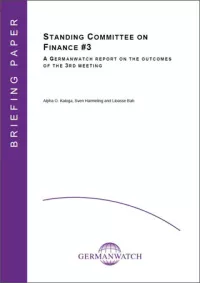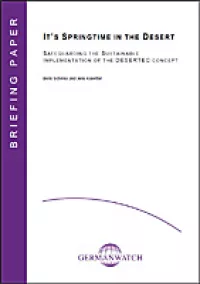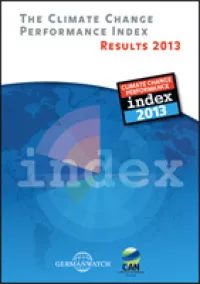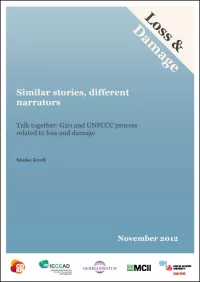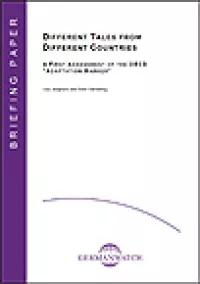
Aktuelles zum Thema
Publication
A Germanwatch report on the outcomes of the 3rd meeting
The third meeting of the Standing Committee on Finance (SCF) took place in Bonn from the 8th to the 10th March 2013. The SCF has been established by the Conference of the Parties to the UNFCCC to assist the Conference of Parties (COP) in exercising its functions with respect to the financial mechanism of the Convention. Certain outcomes...
Publication
A Germanwatch pre-sessional briefing on the AC´s second meeting
The second meeting of the Adaptation Committee represents a critical juncture for its work. The AC – the UNFCCC’s primary advisory body on matters related to adaptation – will have a head start to implement its recently endorsed 3 years work plan...
Publication
Safeguarding the Sustainable Implementation of the DESERTEC Concept
This paper provides an overview of discussions on how to safeguard the sustainable implementation of the DESERTEC concept through the application of a sustainability framework.
Publication
The Adaptation Fund (AF) was established under the Kyoto Protocol of the UN Framework Convention on Climate Change (UNFCCC) in order to finance concrete adaptation projects and programmes in developing countries affected by the global climate change. This report summarises the key decisions taken during the 19th meeting (December 11 to 14) of the Adaptation Fund Board.
Publication
A comparison of the 58 top CO2 emitting nations
The Climate Change Performance Index is an instrument supposed to enhance transparency in international climate politics. On the basis of standardised criteria, the index evaluates and compares the climate protection performance of 58 countries that are, together, responsible for more than 90 percent of global energy-related CO2 emissions.
Press Release
Germanwatch's Climate Change Performance Index published at Doha's climate talks
In a time of heavily increasing greenhouse gas emissions and fossil fuel investments, the light at the end of the tunnel cannot yet be seen. The eighth annual Climate Change Performance Index (CCPI), which was published at the Doha climate talks today by Germanwatch and the Climate Action Network (CAN) Europe, ranks the climate protection performance of the 58 highest emitters worldwide. For the first time, the index used deforestation data, which resulted in a rankings drop of countries with high forest emissions such as Brazil and Indonesia. Once again, no country made it into the first three spots on the list due to a lack of ambition to reach the goal of keeping global warming below 2 degree Celsius.
Press Release
Germanwatch publishes new Global Climate Risk Index at COP18 in Doha
Most damages resulting from weather extremes are often not recognised by international media, unlike Sandy's destruction at the U.S. east coast a few weeks ago. But in 2011, poorer developing countries have been hit much harder in average, according to the new edition of the Germanwatch Global Climate Risk Index. The ranking, which was presented today at the UN climate summit in Doha, concludes that Thailand, Cambodia, Pakistan and El Salvador are on top of those countries that suffered most from extreme weather events in 2011.
Publication
Talk together: G20 UNFCCC process related to loss and damage
Natural catastrophes, many of which are directly or indirectly expedited by climate change, take a heavy toll on people and economies. In 2011 a record high in economic damage was reached, with an estimated loss of more than US$350 billion. The human toll is...
Weitblick
we are living through some interesting, decisive and formative times. We are calling for change – a Great Transformation. On a small scale, civil society and various stakeholders are already mobilising, sometimes quietly, sometimes more vocally. Alliances and partnerships are forming, adopting highly diverse approaches and networking on a national or international scale...
Publication
A First Assessment of the OECD "Adaptation Marker"
In response to the launch of the OECD "Adaptation Marker" in 2010 and the first complete Creditor Reporting System dataset published in March 2012, this paper ex-amines the credibility of the marker. Our assessment reveals that far less projects than the donor countries reported are in fact relevant to what can be considered climate change adaptation.

